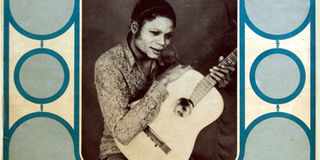Remembering Bavon Marie Marie: Talented boy in brother’s shadow

Cover of an album by legendary Congolese guitarist Bavon Marie Marie of Negro Success band. He died on August 5, 1970. PHOTO | FILE
What you need to know:
- Your guess is right, he is indeed the younger brother of Franco Luambo Makiadi, one of Africa’s greatest musical icons. You must be familiar with Franco’s band, TPOK Jazz.
- Bavon learnt to play the guitar before running away from home, ignoring his mother’s and Franco’s disapproval in 1961 at the age of 17. Like the prodigal son, he returned home to Léopoldville, present day Kinshasha, and immediately begun playing for Orchestre Jamel, then a group of young musicians.
- Many discussions concerning the young man who died at the age of 25 are normally held online. The hardest question usually is, could Bavon have overshadowed Franco had he lived longer?
A ‘night runner’ is not an entirely dangerous fellow, unless provoked. Apart from inconveniencing or interfering with people’s comfort at night, ‘night runners’ are harmless. But if you happen to come across them as they go about their business, it is advised that you take cover. This is because once they spot you, you immediately become an enemy. They will make sure that harm comes your way. That’s where the sorcery comes in.
Sounds very scary, doesn’t it? It is.
That is why you would understand the fear expressed by Bavon Marie Marie as he went about writing his very popular song, Maseke ya Meme (A sheep’s horn ). I would be scared if I was surrounded by sorcerers, but fortunately, his demise was not by their hands
In the early hours of August 5, 1970 , a tragic road accident took away the life of the then young and talented guitarist Bavon Luambo Siongo, famously known as Bavon Marie Marie.
Your guess is right, he is indeed the younger brother of Franco Luambo Makiadi, one of Africa’s greatest musical icons. You must be familiar with Franco’s band, TPOK Jazz.
Bavon was in the car arguing with a woman later to be known as Marie Jose Simplicite over custody of their son, Aime Siongo (currently a pastor in America). As a result, Bavon, who was driving, did not notice the incoming truck which they rammed into. Bavon died on the spot while Marie survived with broken legs.
Had he lived through the 1970s, there is no doubt that Bavon would have taken his band, Negro Succes, to great heights. Marie Jose passed away in November 2014.
Franco was full of grief in fact a few years later he would sing about his grief in the song Kinsiona. Watching a recording of him preforming the song in Utrecht in 1987, you could feel emotions pour out of him.
STAR ATTRACTION
It is said that Bavon and Franco were sworn enemies, but Bholen, who headed Negro Success, thought otherwise. According to him, the band died when the initial founders, Vicky Longomba and Brazzos, left for TPOK Jazz in 1963. They had lost their equipment and venue. Franco offered equipment to the band, a gesture that makes it impossible to believe that Franco did not want his brother to succeed.
According to Gary Stewart in his book Rumba on the River: A History of the Popular Music of the two Congos, Bavon learnt to play the guitar before running away from home, ignoring his mother’s and Franco’s disapproval in 1961 at the age of 17. Like the prodigal son, he returned home to Léopoldville, present day Kinshasha, and immediately begun playing for Orchestre Jamel, then a group of young musicians. He then moved to Orchestre Cobantou that was headed by Paul Ebengo, Francos’s former mentor famously known as Dewayon, before settling with Negro Succes in 1964.
American veteran radio presenter Alastair Johnson has documented Bavon’s life and, according to him, “Negro success spearheaded a youth movement that threatened to unseat the then supreme OK Jazz (Franco’s band) with street slang lyrics and a hip of fashion sense.”
Bavon was the band’s star attraction. He was obsessed with his looks, which saw him use eyeliner and skin lightening creams. He was also flamboyant, typical super star.
The band released more than 50 albums. Bavon once dated a woman called Lucie, and in a series of songs, he spoke his adoration of her. Just like his big brother, Bavon had the gift for writing songs. His melodies and lyrics were just as infectious. We see this in his song Lucie Tozongana, (Lucie let’s reconcile ) in 1966.
Many discussions concerning the young man who died at the age of 25 are normally held online. The hardest question usually is, could Bavon have overshadowed Franco had he lived longer?
They say that an elder at the bottom of a well sees further than a young person on top of a hill. I posed the same question to rumba pundit and Likuyani constituency political aspirant Mr Jerome Ogola, who said: “Bavon is easily one of the legends of Congolese rumba, having been a pillar of Negro Success. Apart from Franco himself, no one could come close to Bavon’s mastery of the guitar, and he is easily the most successful guitarist of the OK Jazz school of rumba.”
Ogola adds that Bavon was also a disciplined musician who concentrated on his work, as evidenced by the fact that he spent almost the whole of his career in two bands — Jamel and Negro Succes.
Opinions are not necessarily facts, we may never know how successful he would have become but what we shall never forget him. Kende malamu, go in peace Bavon Luambo Siongo.




